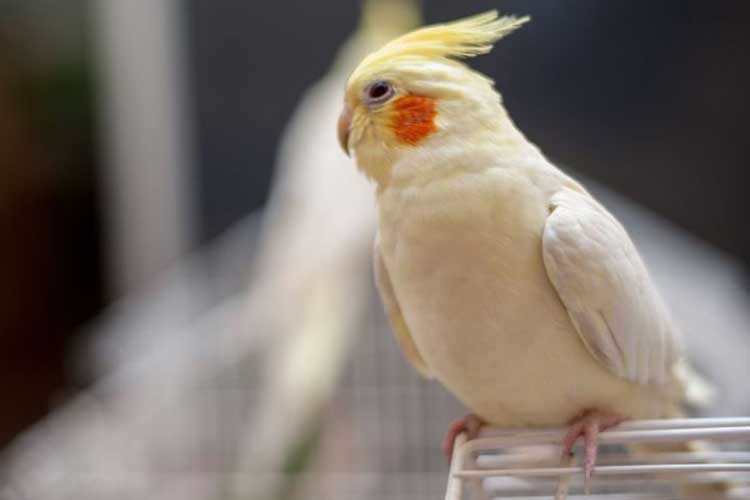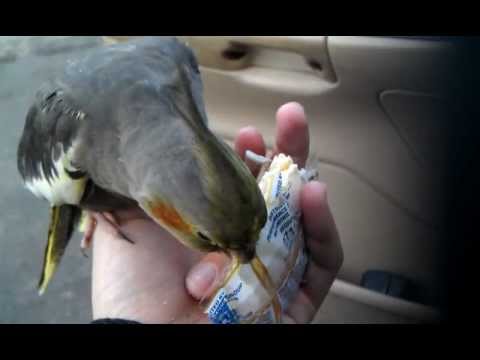Cockatiels are adorable and affectionate pets. And, that’s why cockatiel owners around the world are very careful about the diet of their pet birds (as they should be). Thus, a common question frequently arises on the internet forums:
Can cockatiels eat crackers? In short, pet cockatiels can eat crackers and it’s not generally harmful to them. However, we don’t suggest you frequently feed your cockatiel friend crackers. Because, though you can consider feeding tasty crackers to your cockatiels, overfeeding is harmful to them.
Want to know why? Well, for that, you have to stick with us till the end of this discussion.
Can You Feed Crackers To Cockatiels?
According to a Wikipedia report, crackers are mainly made with carbohydrate contents such as flour, starch, vegetable oils, seeds, cheese, etc. Pet birds can easily consume these items.
Therefore, it is perfectly safe for you to feed crackers to your cockatiel. In fact, you’d be glad to know that cockatiels like to eat crackers very much.
However, although feeding crackers will not cause any immediate harm to your cockatiel friend, it is not a good idea to feed crackers to your cockatiel daily. It’s because crackers do not contain the much-needed nutrition values for cockatiels.
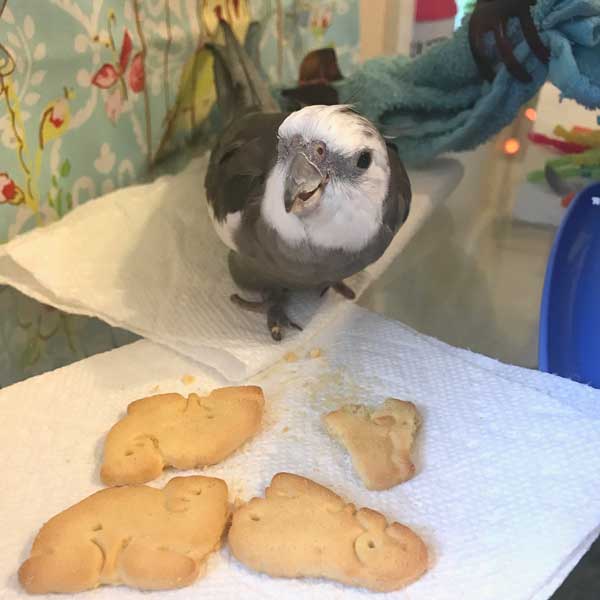
For instance, a cockatiel must be on a healthy diet that has a good proportion of vitamins, minerals, water content, lipids, fibers, unsaturated carbohydrates, and proteins (according to the 1991 study “Cockatiel (Nymphicus Hollandicus) Nutrition“.
Now, if you constantly feed crackers to your cockatiel, it will only get a high dosage of carbohydrates from the sugary crackers. As a result, the health consequences will not be very favorable for your bird friend.
On top of that, excessively feeding crackers to your cockatiel can cause your bird friend to gain excessive weight. As a result, your cockatiel might become sick due to the increased body mass.
You wouldn’t want your cockatiel to die from obesity, right? That’s why it’s not a good idea to make a habit of feeding crackers to cockatiels.
Furthermore, salty crackers usually contain a lot of solid salts, which are perfect for humans to consume. But, eating excessive solid salt is very dangerous for Birds. Especially in the case of eating crackers, you have to keep in mind that the solid salt amount in the crackers is suitable for humans to eat.
However, this much salt is not healthy for a small bird to consume. It’s because eating a lot of solid salts can cause small birds to have hyper blood pressure.
Now, if you can feed your cockatiel cream crackers that have a good amount of sodium ion and a very small amount of solid salts, it might not be as harmful as feeding the bird.
But, even in this case, we suggest that you practice moderation when feeding crackers to your cockatiel.
Do Cockatiels Like crackers?
Well, NSTA tells us that crackers are sweet, crunchy, smell good and they are very tasty in general. That’s why cockatiels love to eat it so much. On top of that, they have no problem digesting the crackers no matter how frequently they eat them.
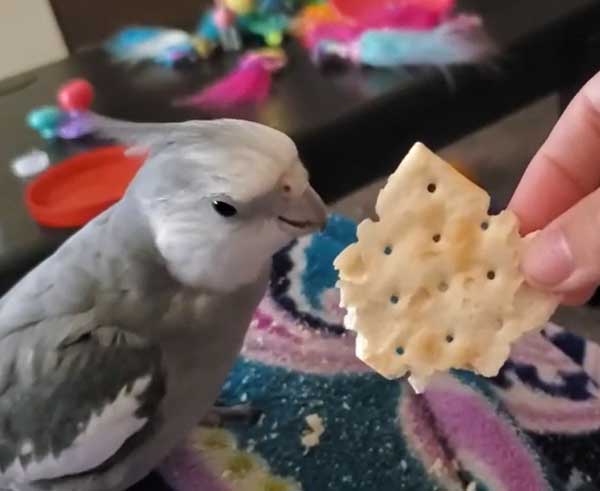
So, any cockatiel will be really happy to have a bite of your crackers any time of the day.
Health Benefits And Risks For Cockatiels Eating Crackers
Feeding crackers to your cockatiel can be both beneficial and harmful. However, the harms of feeding crackers to a bird always outweigh the positive sides.
For instance, the benefit of feeding crackers is mainly the fact that your cockatiel friend will obey your commands (if you reward it by giving it crackers every time it obeys your command).
Plus, since crackers have carbohydrates in them, feeding them to your cockatiels will give the bird an extra boost of energy.
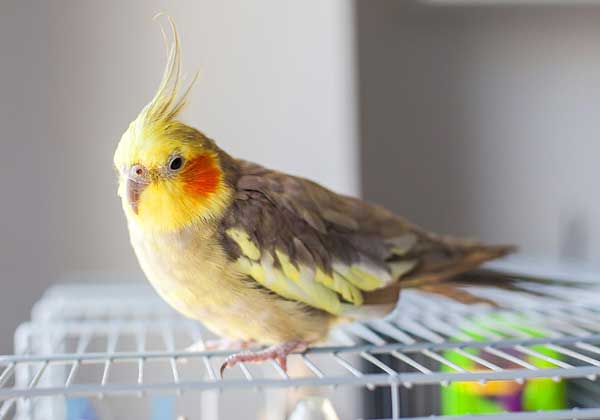
Now, on the flip side, the main risk of eating crackers for cockatiels is that they might develop obesity and deficiency of iodine in their body (if they frequently eat crackers).
On top of that, fatty snacks can create abnormally high blood pressure for the cockatiels. As a result, the cockatiels might die due to stroke, cardiac arrest, or other heart diseases.
After the above discussion, we’ve got to say that you can definitely feed crackers to your cockatiels. But, ensure you do not overfeed your adorable bird.
How Much Crackers Should Cockatiels Eat?
The safe amount of crackers that cockatiels can eat daily is 40 to 50 grams a day. That means it is safe to feed your cockatiel up to 5 crackers per day.
Whether you’re going to feed the crackers all at a time or one cracker at a time is completely up to you (as long as the daily limit does not exceed).
Let’s get to watch a video on cockatiels eating crackers:
Can You Feed Crackers To Baby Cockatiels? If So, How?
You can feed crackers to your baby cockatiels every day. It’s perfectly safe. But, you should only feed below 30 g of crackers to a baby cockatiel each day.
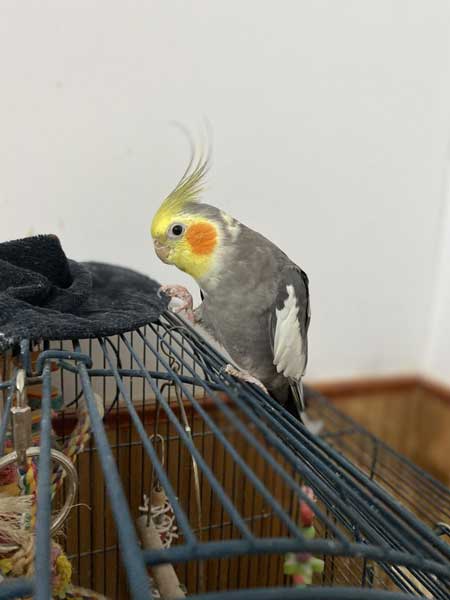
As we have mentioned above, it is safe for an adult cockatiel to eat up to 50 g of crackers. So, the dosage for a baby cockatiel should be close to half the amount for adults (25 to 30 g per day).
Related Questions (FAQs)
Eating cheese crackers is perfectly safe for cockatiels. However, you should keep in mind that cheese contains a high dosage of lactose, which is not suitable for birds to consume in high amounts. So, it is not safe to frequently feed cheese crackers to your cockatiels every day.
Any food item containing too much spice, onion garlic sugar, solid salts, caffeine fat, and saturated carbohydrate is completely harmful to cockatiels. The best alternative to these foods can be balanced diets that have high fiber content (such as sunflower seeds, fruit seeds, kiwi fruit, peanuts, etc).
Final Summary:
Well, that’s all there is, people. We hope you’ve got a clear answer to this question, can cockatiels eat crackers?
The summary of the discussion here is that you can indeed feed tasty crackers to your cockatiels. However, you have to make sure that you do not overfeed your bird. It’s because feeding bland foods such as crackers does not provide the necessary nutrients that a cockatiel bird needs.
Do you know if your cockatiels can eat celery or onions? Read our articles about it to learn more.
